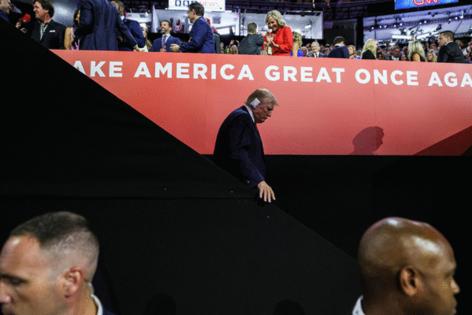Stephen L. Carter: Is the Republican Party still worthy of its name?
Published in Op Eds
For those whose sense of doomy gloom has them searching for a ray of light, look no further than the amusing lawsuit filed by one George Kersey, arguing “that the political stance of the Republican National Committee is inconsistent with its name.”
Amusing — yet not uninteresting.
The complaint has been dismissed as frivolous, and given that Kersey seems to be something of a serial suer, one can scarcely be surprised. But I’d like to take a moment to do what the courts have so far declined to do: take Kersey’s lawsuit seriously.
No, I don’t think he ought to win. But his lawsuit, legally frivolous or not, raises issues about the intersection of law, politics, and reality that are, as one of my professors used to say, worth a venting.
Consider: By arguing that the Republican Party is no longer worthy of its name, the suit implies that the name itself has significance. This is a familiar move, analyzing party monikers the way we do commercial brands. And it’s a move particularly relevant to the moment.
The market incentives to create a strong brand are considerable. When I used to teach trademark law, I offered the students a simplified version of the theory, running like this: A strong brand reduces what are known as “search costs”; that is, the consumer who trusts a particular toothpaste brand does not need to do much work to decide which toothpaste to buy.
Why does this matter? Because the actual cost of a tube of toothpaste, to the buyer, is the price the buyer pays in money plus the time invested in trying to decide which toothpaste to purchase. When a strong brand reduces the time the consumer needs to spend choosing, the company can charge more for the product.
Political party affiliation should, in theory, work the same way. The voter who knows the significance of a party label has lower search costs in deciding on which candidate to support. A candidate who is running in a strongly Republican district needs principally to send voters a simple message: “I am a Republican.” The votes of those who prefer the brand follow. A Democratic candidate in the same district carries the same burden as competitors trying to get buyers to buy a lesser-known toothpaste: finding a way to supply enough information to counterbalance the advantage of the dominant brand.
I go through all this detail so that one might understand what seems to be the essence of Kersey’s complaint: The GOP brand doesn’t mean what it used to. The quality of the toothpaste has declined. The party, he insists, is marketing an inferior product under a brand that promises a far better one.
Let’s suppose Kersey is right and that the Republican label has been devalued. The lawsuit cites no behavior that, were we speaking of consumer brands, would be illegal. If a company wants to destroy the value of its trademarks and service marks, that’s the company’s own business.
Let’s go back to the 1980s, when Coca-Cola Co. damaged the value of its trademark with the disastrous New Coke experiment. Everybody knew that the formula had changed. There was no deception. Coca-Cola itself touted the change.
Years later, long after New Coke had been abandoned, the company was accused of marketing “Classic Coke” with a formula different from the original one — that is, the original one used in 1886. The courts were unimpressed. If the beverage was not up to the mark, the consumers would decide.
That’s the answer to Kersey’s suit too. Maybe this isn’t your dad’s GOP. But the party’s not hiding how far it’s come from its roots. Indeed, at a time when some scholars wonder whether secrets and corruption are endemic to the structure of modern political parties, the transformation of the Republican Party seems to have happened in plain sight. The fundamental ways in which the party has changed are out in the open for anybody to see.
The Democratic Party faces similar concerns about how it’s changed, but not, as far as I know, any lawsuits. Nevertheless, the analysis is the same. Right now, lots of voters seem to be treating the new Democrats like New Coke. But the party has been down this road before. After the Dems went to the mat for civil rights in the 1960s, voters punished them for a generation. Yet, as it happened, their brand had actually improved. It just took a long time for the voters to catch up. That, too, is sometimes how markets work.
_____
This column does not necessarily reflect the opinion of the editorial board or Bloomberg LP and its owners.
Stephen L. Carter is a Bloomberg Opinion columnist, a professor of law at Yale University and author of “Invisible: The Story of the Black Woman Lawyer Who Took Down America’s Most Powerful Mobster.”
_____
©2024 Bloomberg L.P. Visit bloomberg.com/opinion. Distributed by Tribune Content Agency, LLC.




























































Comments